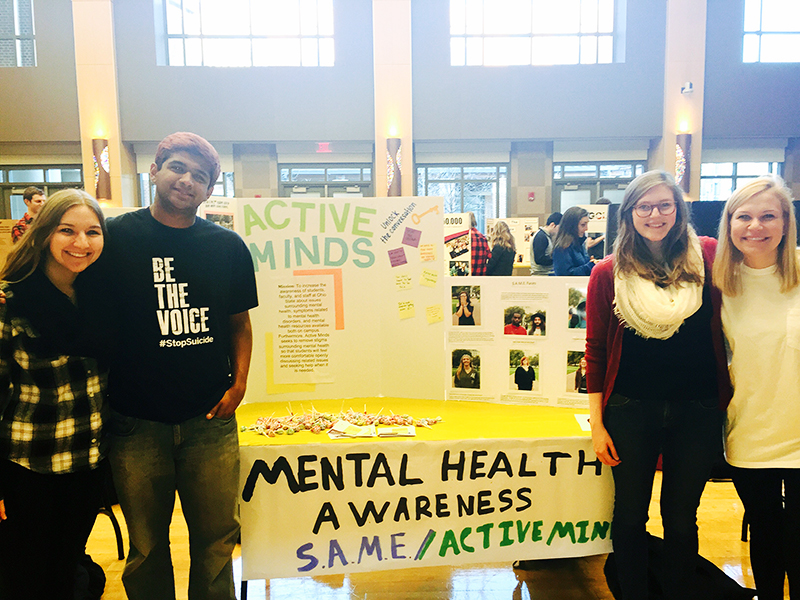
Members of Active Minds pose at the Spring Involvement Fair. Courtesy of Sarah Kelley
The transition into college presents a series of balancing acts some students aren’t fully prepared to tackle. Managing independence that brings forth responsibility, the pressure to succeed academically, getting a foot in the workforce door, and coping with peer pressure while finding time to eat and sleep taxes young adults mentally and physically.
It is no surprise that most mental illnesses in young adults surface during this shift, said Elizabeth Grubb, vice president of the OSU chapter of Active Minds. Most individuals, at some point, will experience a state that affects their mood, thinking and behavior. Sometimes the mental illness developed during this transition can have a lasting effect.
“The early 20s are a transitional period of change for most. It’s normally the time a mental illness appears,” Grubb, a fourth-year in neuroscience, said.
Active Minds is an outreach program created to combat the stigma of mental illness by encouraging students to seek help early to prevent tragedy.
Active Minds came to Ohio State last semester when a group of students felt compelled to introduce a program that could make a lasting impact on campus regarding general mental illness, said Sarah Kelley, the outreach chair of Active Minds and the founder of the OSU chapter. They agreed the issue was prevalent among college students and observed a lack of conversation regarding the problem.
Kelley, a third-year in neuroscience, is initiating the Human Narrative Project, a compilation of stories submitted anonymously by students that describe the impact mental illness has had on their life. The stories will then be read aloud at an event on Sunday at 7:30 p.m. in the Senate Chamber at the Ohio Union.
“The purpose of the event is to humanize mental illness and create an environment for those affected to feel connected,” Grubb said.
Kelley said she hopes this event will serve as a voice for students on campus experiencing the effects of mental-health issues and will create an atmosphere of acceptance and solidarity.
“We want to show students they aren’t alone and let them know what resources are available to them,” Kelley said. “We don’t want people to see those with mental illness as ‘the other.’ We’re hoping this will make people more accepting.”
Grubb and Kelley said that all students, staff members and faculty are encouraged to attend the event to hear the narratives of OSU community members who have been in some way affected by mental illness, be it personal experience or that of a friend or family member.
Kelley said Active Minds also addresses mental health at OSU in other ways.
“We openly talk about mental health on campus by passing out pamphlets on the Oval and in the library with tips on how to notice warning signs, how to deal with stress, how to help friends and where to receive treatment, and we get really positive responses,” Kelley said.
About 26 percent of Americans older than 17 can be diagnosed with a mental illness, according to Active Minds’ website. Additionally, around 14 years old is when about half of all adult mental illnesses, such as depression and anxiety disorders, begin. Symptoms of about 75 percent of these illnesses can be seen by age 25.
“We don’t want people to ignore the issue. A lot of students get really happy to hear there is a mental-health organization on campus,” Kelley said. “A lot of people identify with it, and it positively influences the attitudes about Ohio State and the climate surrounding mental health.”
Treatment for dealing with mental-health issues is available at the Office of Student Life’s Counseling and Consultation Service.
Correction April 13: A previous version of this story incorrectly stated the name of the office that provides treatment for mental-health issues.


